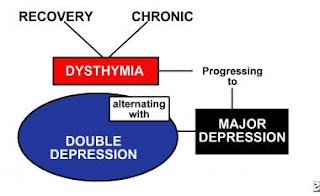Mood Disorders: What Is Dysthymic Disorder?
This mood disorder is a less severe form of depression. Although less extreme, dysthymic disorder causes chronic of long-lasting moodiness. With dysthymic disorder, low, dark moods invade your life nearly every day for two years or more. Dysthymia is contrasted with a full major depressive episode that lasts two years or longer, which is called chronic major depression.
Dysthymic disorder can occur alone or along with other psychiatric or mood disorders. As with depression, dysthymic disorder is more common in women than in men. A family history of mood disorders is not uncommon. This mood disorder tends to appear earlier than major depression, although it can begin anytime from childhood to later in life.
Up to 5% of the general population is affected by dysthymic disorder. But its cause is not well understood. A combination of factors likely conspires to create this mood disorder. These factors may include:
- Genetics
- Abnormalities in the functioning of braincircuits involve in emotional processing
- Chronic stress or medical illness
- Isolation
- Poor coping strategies and problems adjusting to life stresses
These factors can feed off each other. For example, if you always see "the glass as half empty," you may reinforce the symptoms of depression. And a chronic mood disorder can sensitize you to stress, further feeding your risk for depression.
Symptoms of Dysthymic Disorder
In addition to chronic low moods, common symptoms of this mood disorder include:
- Feelings of hopelessness or helplessness
- Trouble sleeping or daytime sleepiness
- Poor appetite or eating too much
- Fatigue or low energy
- Low self-esteem
- Trouble concentrating or making decisions
A diagnosis of dysthymic disorder in adults requires at least a two-year history of depressed mood for most of the day on most days, along with at least two of the symptoms noted above. Although some symptoms may overlap, you may be less likely to have weightor sleep changes with dysthymic disorder than with depression. You may also tend to withdraw more and have stronger feelings of pessimism and inadequacy than with major depression.
https://www.webmd.com/mental-health/mood-disorders#1-2


Comments
Post a Comment